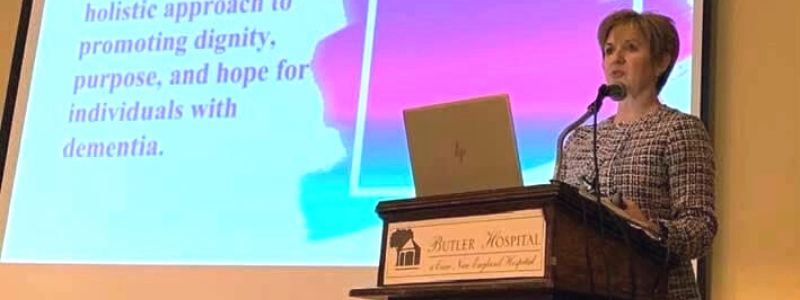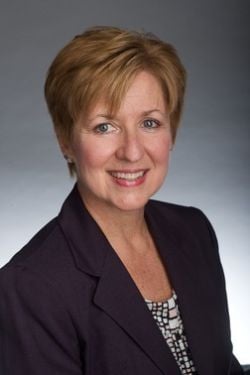 Laurie Mantz is On a Mission to Improve Dementia Care in Rhode Island"
class="bg-img"
fetchpriority="high"
loading="eager"
decoding="async">
Laurie Mantz is On a Mission to Improve Dementia Care in Rhode Island"
class="bg-img"
fetchpriority="high"
loading="eager"
decoding="async">
News from the Memory and Aging Program at Butler Hospital
June, 2022
For nearly a decade, Laurie Mantz has been working to improve care for people living with Alzheimer’s and other forms of dementia. Over the last five years she’s turned that mission into a thriving business, training healthcare professionals, first responders and family caregivers on how to provide evidence-based, person-centered dementia care. She’s also opened Memory Cafés at nine locations throughout Rhode Island.
Now, thanks to a new grant awarded through CareLink, she’s bringing her training directly into homes free of charge, where people with dementia and their family caregivers can benefit the most.

Mantz is founder and CEO of Dementia Training for Life, LLC. She is a registered and licensed occupational therapist, educator and certified dementia care practitioner and trainer. She is also a family member; both of her grandmothers died from complications due to dementia.
Driven by her personal and professional experience with dementia, Mantz has become a staunch advocate for the rights of both the individuals diagnosed with dementia and their caregivers. She has marched on Capitol Hill, testified at both the NH and RI state capitals, and is a member of the Lt. Governor’s Executive Board for the Rhode Island State Plan for Alzheimer’s disease and Related Disorders.
Here, she shares the story behind her business, some key pieces of advice for dementia caregivers, and the exciting new chapter of her mission that will be unfolding in the year ahead…
My first experience with dementia was as a family member. I lived through it with both grandmothers as well as my dad, so I know first-hand what a challenge it can be. Professionally, I worked for many years as an occupational therapist and a clinical educators, so I did a lot of work helping other therapists coming up in ranks and a lot of teaching, and eventually became executive director of a memory care community.
During that time I heard from a lot of family members that doctors and nurses didn’t necessarily understand the complexities of dementia diseases. So, I started doing training in my community on a part-time basis. That was in 2013 when I was still living in New Hampshire. In 2017 I moved to Rhode Island and decided to make it a full-time business, and that’s how I founded Dementia Training for Life.
Initially the focus was only on providing training to medical professionals, but over time the scope has expended to people living with dementia and their care partners as well. It was very obvious through research and experience that when individuals are diagnosed with dementia, they tend to self-isolate and become disconnected from their communities, which is the last thing they should do. So I decided to open Memory Cafés across Rhode Island where people living with dementia and their care partners can gather socially, knowing how important socialization is to slowing down the disease.
But it’s also a place where they can get emotional support from each other and take away new skills and knowledge about how they might interact or do something new at home that they didn’t think about before that would bring joy to their lives and increase their circle of friends. The Cafés have been on hold since COVID hit, but we’re hoping to get them back up and running again soon.
The most common misconception is that dementia is the disease. Dementia is not the disease, it’s the result of a disease. There are over 120 diseases that can cause cognitive decline and they all present in different ways.
For example, Lewy body disease presents with movement and sleep disturbances, whereas Alzheimer’s presets with more memory and perception disturbances. Understanding those differences makes it much easier to know what to expect and to prepare and respond accordingly.
Many people don’t recognize how much environment plays into abilities and difficulties. Simple adaptations can go a long way toward making a person more independent, but you’ve got to keep it simple. Advances in technology are wonderful but if you think about how someone’s been doing self-care for 60 years and then you throw something new at them you’re actually making it harder for them.
For example, providing pump soap instead of bar soap – providing bar soap allows that muscle memory to go to work for them and then they know what to do, whereas pump soap might be interpreted as lotion. Another example is an electric toothbrush. You might think you’re making the process easier, but it might really just be more confusing.
Another key is to get into their world, wherever they are at the moment, and assume the role that they’re giving you at the moment. Their behavior may have been set off by a sound, a hallucination, or something else happening in their body that they can’t control. It’s important to understand that it’s beyond their control and get on the bandwagon and go for the ride, unless their health or wellbeing is at risk.
Don’t get hung up on the factual details they’re getting wrong, but instead think about the emotion that they’re feeling and what they may be trying to convey at that level. It’s really hard to help and support someone who’s frightened and it’s even harder when you become upset. Remember that the behavioral responses we see in all forms of dementia are really a means of communication – it’s up to us to figure out what they’re trying to communicate.
I also understand how difficult it can be to navigate the family dynamics when a loved one is living with dementia. I think the most important thing is open and honest communication. I also suggest designating a person in the family to act as the lead in advocating and supporting the needs and wants of the individual that’s been diagnosed.
Yes, I’m very excited about this. The Alzheimer’s Disease Program Initiative [ADPI] awarded a three-year, $904,000 grant to CareLink [an East Providence nonprofit healthcare group] to provide new services and treatments for Rhode Island adults with Alzheimer’s disease and other forms of dementia.
Through that grant, I’ll be working with CareLink to provide evidence-based programs for people with mild to moderate dementia right in their own home. We’ll provide services like speech language pathology and occupational therapy free of charge, with the goal of helping them to live in their homes longer, more safely, and with a better quality of life.
We’re really hoping to close that gap for people, asking, “What do I do now?” We’re especially trying to provide services for individuals living alone and those in underserved communities.
Anyone interested in learning more and applying for free, in-home services is encouraged to visit www.carelinkri.org or email adpidementia@carelink.org.
Disclaimer: The content in this blog is for informational and educational purposes only and should not serve as medical advice, consultation, or diagnosis. If you have a medical concern, please consult your healthcare provider or seek immediate medical treatment.
Copyright © 2023 Care New England Health System